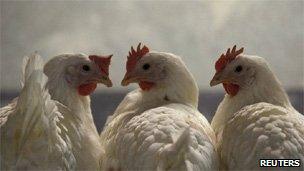Dioxin animal feed scare shuts German farms
- Published

Hundreds of farms had already been banned from selling eggs
More than 4,700 German farms have been closed after large amounts of animal feed were found to be contaminated with dioxin, a poisonous chemical.
Officials insist the levels of dioxin do not pose a risk to humans, and that the closures are only a precaution.
Most of the affected farms are pig farms in Germany's Lower Saxony region.
Meanwhile, the EU has warned that eggs from farms affected by dioxin have entered the UK in processed products destined for human food.
The eggs had been sent to the Netherlands for processing and then on to the UK where they were likely to be destined for use in the production of a variety of food stuffs including mayonnaise and pastries.
The dioxin scare has prompted South Korea to block imports of German pork and poultry products from reaching consumers due to health concerns, local media reported on Friday.
No deliveries
Last week, more than 1,000 German farms were banned from selling eggs after dioxin was found in eggs and poultry.
The government described the extra closures as a precautionary measure; on Wednesday it revealed that some feed for pigs and chickens had been contaminated with dioxin when it was being made.
The origin of the contamination has been traced to a distributor in the northern state of Schleswig Holstein, where oils intended for use in bio-fuels were accidentally distributed for animal feed.
Initially, the scare was confined to Germany but then it emerged that a batch of eggs had been exported to Holland and from there to Britain.
British authorities said that the amounts of dioxin - which is linked to the development of cancer in humans - in any eggwould be very small,, externaland not enough to be dangerous.
The difficulty is that German official assurances of safety are being combined with inexact information which seems to change by the day, says the BBC's Steve Evans in Berlin.
The dioxin was discovered in late December, but the extent of the problem was only revealed earlier this week when German officials said 3,000 tonnes of feed had been affected.
Germany's agriculture ministry said on Thursday that most of the closed farms were ones raising pigs.
The ministry said the farms would not be allowed to make any deliveries until they had been checked and found to be clear of contamination.
And European Commission health spokesman Frederic Vincent told a news conference how the problem had now reached Britain.
"Those eggs were then processed and then exported to the United Kingdom... as a 14-tonne consignment of pasteurised product for consumption," he said.
"Whether it went into mayonnaise, pastries, I don't know. So we will probably take a look at this with the UK authorities and see what was done with these eggs."
German officials will brief their EU counterparts next week and the incident could lead to new rules on animal feed.
Dioxins are toxins formed by industrial processes and waste burning.
They have been shown to contribute to higher cancer rates and to affect pregnant women.
- Published7 January 2011
- Published5 January 2011